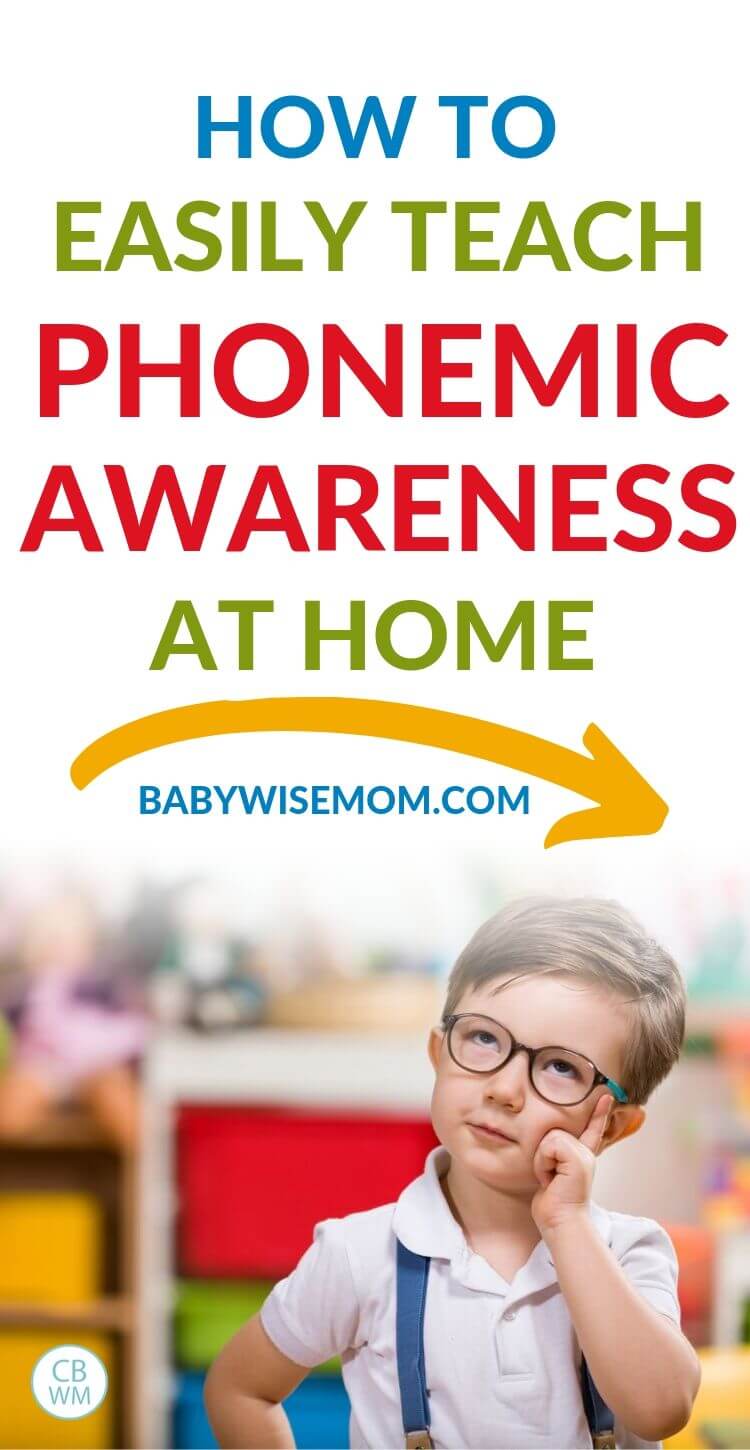The importance of phonemic awareness for a pre-reader or pre-writer. What that even is and how to teach your child at home.
Here is the next post by blog reader, Susanne. Susanne is a reading specialist and is writing a five-post series of posts on early literacy. Read her first post:
Enjoy!
~~~~~~~~~~~~~~~~~~~~~~~~~~~~~~~~~~~~~~~~~~~~~~~~~~~~~~~~~~~~~~~~~~~
Post Contents
PHONEMIC AWARENESS DEFINITION
“The ability to hear and manipulate sounds (Fredricks,2001).” This is a skill that must develop before your child learns to read and write. When a child recognizes that words have distinct sounds and parts, they are developing phonemic awareness. It is hard to read and write if you don’t have the ability to hear, manipulate, and distinguish sound patterns in language.
LEVELS OF PHONEMIC AWARENESS
- Word Level: A child must a group of sounds make a word. For example, sun-shine, makes the words sunshine when said together.
- Syllable Level: A child must also understand and identify various syllables within a word. For example, pic-nic, these two parts along do not comprise a word but together they form a meaningful word.
- Onset-Rime Level: A child must recognize that two or more words have similar sounding parts. An example of this is, hat and cat, because both of these words contain the -at sound.
- Phoneme Level: This is the most complex level because a child must identify and recognize that every word is comprised of separate units of sound. For example: the word frog has 4 phonemes /f/ /r/ /o/ /g/.
ACTIVITIES TO FOSTER DEVELOPMENT OF EACH PHONEMIC LEVEL
Word Level Activities:
(Age 3 year old and up)
- Blending: Using compound words, say the word in two parts with a pause in between. An example of this is sun—shine. Then ask your child to guess what the word is.
- Segmenting: Using compound words, say a compound word without a pause in between. Then ask, “Can you break the word _______ into two smaller words?” For Example: You ask them to break the word rainbow into two smaller words, rain—bow.
- Deleting: Using a compound word, give the whole word and ask the child to remove one of the units. For example: “Say sunshine. Now say sunshine without saying sun.” The child should respond “shine.”
Resource List: List of compound words
Syllable Level Activities:
(4 years old and up)
- Blending: Using a word with two syllables, say the word in two parts with a pause between the syllables. An example: “You put the parts together to make a whole word. Ready? Flow-er.” The child should say “flower.”
- Segmenting: Using a two syllable word ask the child to break the word into two parts. An example: “Let’s break the word tractor into two parts.” The child should say, “Trac- tor.”
- Deletion: Using a two syllable word, ask the child to say a word without on of its parts. An example: “Say wonder. Now say wonder without saying won.” The child should say “der.”
Resource List: Worksheets with words containing two syllables
Onset- Rime Activities:
(4 years old and up)
- Recognizing rhyme: Ask if two words rhyme. Example: “Do cat and hat rhyme?” yes. “Do dog and cat rhyme?” no.
- Generating rhyme: Ask “Can you tell me a word that rhymes with car?” star.
- Blending: Ask your child to blend the two parts of the rhyme together. C-at, f-ish, d-og.
- Deletion: Ask you child to not say part of the word. Example: “Say Street. Now Say Street without saying str.” -eet.
Resource List: One line rhyming dictionary
Phoneme Activities
(late 4 year old and up- This is a skill usually taught in Kindergarten.)
- Detection: Ask your child if he can hear a particular sound. Example: “Tell me if you can here a /t/ (say the sound not the letter name) if this word. Cat (yes), tip (yes), lip (no).”
- Blending: Ask your child to put the sounds together to make a real word. Start with words that are two letters then work your way up. Example: (Say each sound individually and slowly) /f/ /r/ /o/ /g/- frog.
- Segmenting: Ask your child to say each sound individually in the word. Start with words that are two letters then work your way up. Example: “What sounds do you hear in cat?” /c/ /a/ /t/
- Deletion: Ask your child to say a word without a sound. Example: “Can you say the word meet without the /t/ (say the letter sound not the letter name) sound? -me.
Book Resource List
- The Complete Phonemic Awareness Handbook by Anthony D. Dredericks
- Phonological Awareness Assessment and Instruction: A Sound Beginningby Lane and Pullen
- ***Phonemic Awareness in Young Children: A Classroom Curriculum by Adams, Foorman, Lundberg, Beeler*** If you only buy one book, by this book. It is a great resource that is easy to do and has lot of creative activities and ideas that parents can use!


